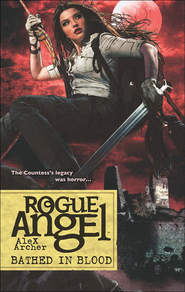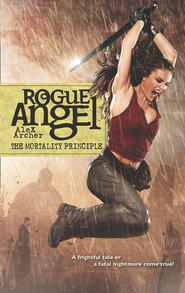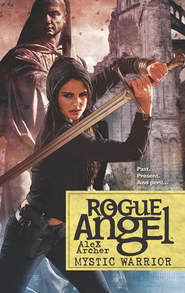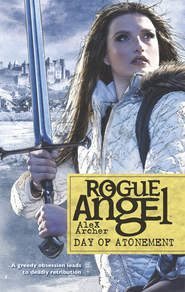По всем вопросам обращайтесь на: info@litportal.ru
(©) 2003-2025.
✖
The Lost Scrolls
Автор
Год написания книги
2019
Настройки чтения
Размер шрифта
Высота строк
Поля
Annja stared at him. He smiled but said nothing more. She suspected he’d used up his allotment of spoken words for the day.
“Ali has a second degree in biochemistry, you see,” Pilitowski explained.
“Ah,” Annja said.
“WELL, YOU KNOW, Annja,” the young Egyptian archaeologist said as he walked with her into the huge old brick building next to the dig where the team had set up headquarters, “we make no claims concerning the veracity of the scrolls. We only recover them. And are thrilled to do it, if I may say so.”
“As well you should be,” she said. “It’s just that Atlantis is a hot button for archaeologists in the U.S., Ismail.”
Their voices echoed slightly in the enormous space. Wooden partitions had been set up to delineate work areas and offices.
“It is for all of us,” he said. “We are, after all, on a quest for the truth, are we not?”
“Oh, yes,” she agreed.
“And should we not follow the truth wherever it might lead us?”
“All right. I see where you’re headed with this, Ismail. And you’re right. If I’m going to be a serious scientist, then evidence needs to outweigh my preconceptions.”
He smiled and nodded with boyishly visible relief.
“Now,” she said, “let’s go see this evidence.”
The headquarters appeared to have spent much of its career as a warehouse, with high walls of yellowish brick, steel struts for rafters and grimy skylights admitting brownish morning light. It smelled more than slightly of fish. Annja presumed it must be their proximity to the waterfront. The smell couldn’t last decades, could it?
They walked down an aisle to an open doorway. From inside came a blast of raucous feminine laughter. Ismail’s fine features tightened briefly.
He ushered Annja into a wide room, well lit by banks of standing lights. Several people worked at a row of computers. Others examined blackened-log-like scrolls on a big table.
“You might find this interesting,” Ismail said, leading her toward a table. On it stood a curious device like a bundle of upright rods worked through one of the burned scrolls. “It’s based on a machine invented in the eighteenth century to unroll burned papyri.”
The two technicians operating it had teased out several inches of scroll. It resembled charred bark being peeled from a log. They paused to smile and nod at Annja as Ismail introduced them.
“We mostly make use of magnetic-resonance imaging to take pictures of the scrolls, layer by layer, without unrolling them,” he said. “But we explore every means of recovering their content. And over here—” he turned to a wide white table where bright white underlighting illuminated the faces of the Egyptian-looking man and European-looking woman bending over it “—we have our apparatus for photographing fragments of broken scrolls we find.”
What sounded like a great gong tolled. Everybody stiffened. The woman from the scroll unroller, whom Ismail introduced as Bogumila, exclaimed, “Aleksy, call Ali and Szczepan and Maria. Tell them to come quickly!”
One of the pair at the photo table took out a cell phone and whipped it open. He spoke quickly in Polish.
Others were beginning to arrive on the run from the other cubicles. Apparently the gong, which she guessed was a recording, was turned up high to let everyone in the converted warehouse know there was news.
Everyone crowded before a large flat-screen monitor. An image had appeared, a ragged off-white oblong, with spidery dark gray markings on it that Annja guessed might be ancient Greek. “ Da! ” somebody exclaimed.
A young woman sat perched on a stool by the photographic table, at the other end from the bulky camera itself, which was mounted on a heavy mobile stand. Now she pushed off and came sauntering over. She was strikingly pretty, with pale blond hair done in pigtails that made her round-cheeked face look even younger than it probably was. Her eyes were big and blue, if currently half-lidded as if with contemptuous disinterest. She wore a tight black-and-red top that showed off her healthy figure and an extremely short skirt with horizontal stripes in red and black. For all the horizontal stripes and harsh colors she was stunning looking; Annja fought down an inclination to hate her.
As she approached the flat-screen monitor Annja felt uneasy. China-doll perfect the young woman’s appearance may have been, but she gave a strong impression of negativity.
Excited as they were, the other team members moved back from the screen as she approached. The young woman leaned in, jaw working on a wad of gum.
“Not too close, Jadzia,” the man at the keyboard said. “You are the anticomputer geek.”
She gave him a baleful squint and snapped her gum at him. She stuck a finger toward the screen. The guy at the keyboard seemed to wind up tighter and tighter the closer her fingertip, the nail painted black, got. She read in a bored voice:
“—had in their possession most marvelous stones, like unto gemstones, such as rubies or emeralds, but the size of goose’s eggs, wherein they stored a force as potent as the lightnings. Perhaps this blasphemy, this stealing of the very thunder of mighty Zeus, evoked his wrath and caused him to cast down that which belonged by right to Poseidon.”
She shrugged, popped her gum, straightened up with a little headflip. “That’s it for this page. The break was a physical one. Nothing to translate.”
Everybody cheered and hugged each other and exchanged high fives. Annja noticed nobody tried to embrace the pigtailed blond girl.
“Can she really just read it like that?” Annja asked the air.
She didn’t expect to be answered in the hubbub. But beside her boomed the ever-cheerful voice of Dr. Pilitowski. “Ah, yes, she can. This is the noted Jadzia Arkadczyk. She holds degrees in cryptology and linguistics. She has a remarkable gift for languages. She is, quite simply, beyond genius.”
Annja studied the young woman, who seemed content to stand looking offhandedly at the screen, soaking up the arm’s-length adulation of her comrades. Annja had her own gift for languages. It had formed a key part of her love for travel and adventure.
“I’m impressed,” she said.
Maria was speaking to the girl and nodding at Annja. Jadzia turned and looked at the visitor for the first time. Her blue eyes flew wide.
“I know you!” she exclaimed. “I have seen you on Chasing History’s Monsters .”
“Well, yes, I appear on the show from time to time,” Annja said with authentic modesty. She did not want to be known primarily for her association with the program. Especially among peers as distinguished as these.
“You are the woman they bring on when they wish to cover something up,” the girl went on, voice rising accusatorily, “and undo all the good work done by poor Kristie Chatham!”
2
“They despised everything but virtue,” Annja read, the bubbly water, still hot, gurgling to the slight motions of her body as she kept the book braced open against her drawn-up knees.
Photographic specialist Rahim al-Haj had lent her a copy of Plato’s Dialogues, well grimed and dog-eared by the team, as she took her leave of the recovery site late that afternoon. Unwinding in her hotel room after dinner in one of her favorite fashions, she was reading what Plato had written about Atlantis.
The legend claimed there had been an island outside the Pillars of Heracles, “larger than Libya and Asia put together.” Whatever Plato meant by Asia. A big island, to be sure.
The Atlanteans, the story said, made war on Europe. The Athenians, eventually standing alone, had defeated them. Then violent earthquakes had occurred, followed by floods. In a single day and night the island of Atlantis and all its people disappeared in the depths of the sea. That sounded pretty final to Annja. It did intrigue her that the Athenians apparently suffered greatly from the same catastrophe.
“You never hear that part of the myth when people talk about Atlantis,” she said aloud.
There was a lot of discussion about the founding of Athens. It intrigued Annja to read of what seemed to her to be an equality of men and women in ancient Athens, including in warfare. She was also struck by the claim that Greece had once been a wonderfully green and fertile peninsula that had suffered sorely from millennia of soil erosion. She wondered if there might be something to that part, anyway.
At last the narrative wandered around to Atlantis. It had been built by the sea god Poseidon to impress his human love, Cleito. It was a land of fertile fields, concentric circles of canals, elephants, that sort of thing. She made note of several details to take up with her hosts in the morning.
What made the biggest impression on her was the interval of nine thousand years since the supposed fall of Atlantis. She put her book up on the rim of the sink and closed her eyes and tried to wrap her mind around it.
As someone who had studied geology, and a bit of paleontology, as part of her formal education, she had little trouble coping with nine millennia. In geologic terms it was a fraction of a second.
But for a coherent account of events to survive for nine thousand years—for any kind of knowledge to be transmitted over such a yawning gulf of time—that just made her jaw sag in disbelief.
She was well aware that archeology, especially the relatively new but fruitful practice of applying modern forensic techniques to archeological evidence, was showing that as often as not the written histories bore only a passing resemblance to what could be physically demonstrated to have really happened. History was perhaps not bunk—not altogether. But to say it was inexact was like saying it snows at the North Pole.











